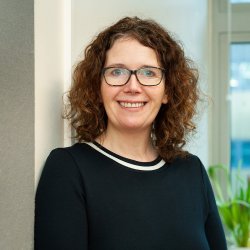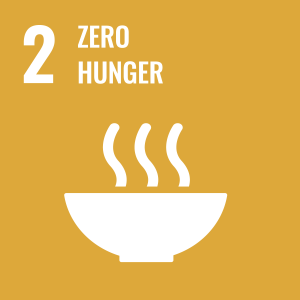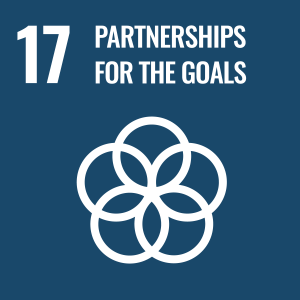
Dr Jill Timms
Sustainable development goals
My research interests are related to the following:







Publications
Environmental upgrading is becoming increasingly important in terms of leveraging sustainability in global value chains (GVCs). Existing research focuses on environmental upgrading as a process, while the drivers and outcomes often remain unclear. We address this limitation through a qualitative case study of the South African fruit industry based on interviews and documents, where we investigate the drivers and outcomes of environmental upgrading strategies with a focus on irrigation water use and sustainability. We share three important findings in our paper, which contribute to the literature. First, we identify environmental risk as an important driver for environmental upgrades that has so far been overlooked. Second, we question the current focus of environmental upgrading strategies on technological interventions. Focusing on technological interventions alone, however, is insufficient to address local and global challenges regarding water resources sustainability. Our third finding emphasises the need to consider the wider environmental and political economic context within which environmental upgrading takes place. This is because environmental upgrading strategies can actively contribute to the development of environmental risks for other actors, within or beyond value chains, and therefore have clear limits in their contribution to increasing sustainability. •Research in South Africa's fruit industry offers insights into processes of environmental upgrading around water management.•Environmental risk is an important driver for environmental upgrades in fruit value chains.•Technological interventions alone are insufficient to address the sustainability of local and global water resources.•Environmental upgrading strategies can actively contribute to the development of environmental risks for other actors.•The GVC approach emphasises how global dynamics touch down locally and interplay with local institutions and governance regimes.
Within the UK, sandwich courses, i.e. degree programmes that include a year spent on a work placement, usually during the third year of a four-year course, are increasingly offered by higher education institutions to maximise the proportion of their graduates moving into employment and, particularly, jobs that are deemed ‘graduate-level’. Indeed, there is evidence of a strong positive correlation between participation in sandwich courses and employment. Although this positive impact is particularly marked for students from widening participation (WP) backgrounds, such students are also significantly less likely to undertake a sandwich course. The article draws on 50 interviews with higher education staff and students to argue that many of the most significant barriers experienced by WP students are related to various temporal challenges. In doing so, it expands the body of work on the frequent mismatch between hegemonic university time and the time of students from under-represented backgrounds. In addition, it argues that WP students are less able than their more privileged peers to take advantage of the ‘slow time’ necessary to undertake a work placement, and that the rhythms of external actors are also relevant when explaining the challenges faced by WP students.
Strong claims are made by both higher education policymakers and institutional leaders about the advantages that can be brought about through ‘datafication’ (i.e. the quantification of human activities through digital means). Nevertheless, we know relatively little about how university cultures and processes may impinge on the rolling out of data practices, particularly in relation to administrative data (rather than that collected through learning analytics and other forms of user-generated data). This article draws on a particular case study—of attempts to widen participation to ‘sandwich courses’ in English higher education institutions—to argue that, in some areas of activity at least, institutional constraints serve to limit datafication substantially, including insufficient time and infrastructure, the prioritisation of data required for other purposes (typically national assessment exercises) and the role of institutional cultures. Cognisant of various problems associated with quantification, the article nevertheless contends that the barriers to the effective use of metrics identified in this research may have a direct impact on institutions’ capacity to recognise and address social inequalities.
Research question: The legacies of sport mega-events are widely contested. Whilst the short-term impacts of the 2010 FIFA World Cup™ in South Africa have been largely considered to be positive, there is little evidence of longer term outcomes. This paper contributes to the sport mega-event legacy literature by presenting empirical evidence of the longer term developmental legacy using a case study of a community-focused sports project. Key factors underpinning sustainable legacy outcomes are identified. Research methods: The Football Foundation of South Africa (FFSA) was selected as a case study due to the novel ways in which the project developed. Thirty-eight interviews were conducted with stakeholders involved directly in the FFSA's day-to-day delivery and management, people from organisations who deliver sport and recreation services at the local and regional levels and children who use the facility. The interviews were recorded and transcribed, and the data were analysed using qualitative content analysis approach. Results and findings: The FFSA is achieving substantial and increasing reach into local, especially disadvantaged, communities. Children expressed very strong positive feelings about the contribution it makes to their lives. Several factors have enabled the FFSA to be successful, with the most critical being the strong institutional context within which the project is embedded involving local, regional, national and global organisations. Implications: The success of the FFSA highlights gaps in mega-event legacy planning. International sport bodies should develop formal mechanisms for drawing their corporate stakeholders together with community-based groups to identify and deliver sustainable developmental programmes.
The Olympic Games, with its distinctive ethos and reach, offers a valuable opportunity for those able to mobilise it as a platform for their own purposes. This paper focuses on how global social justice groups are pursuing this goal. It is argued that the types of protest utilising the Olympic platform change over time and reflect distinct historical phases of the Games. Contemporary anti-Olympic and Olympic watchdog campaigns are characterised by contestation over the prioritising of corporate interests, so contribute to wider critiques of globalising capitalism. The Play Fair campaign for the rights of workers making official Olympic merchandise and supplies exemplifies this, as it mobilises the Olympic platform to question and influence working practices within transnational supply chains. A case study of the campaign is presented, drawing on documentary analysis, interviews and participant observations undertaken since the launch of PlayFair 2012 in February 2010. It was found that by targeting London 2012 corporate discourses of 'ethics' and 'sustainability' in its campaign to ensure a 'sweat free' Olympics, Play Fair connects the production of major sporting events to wider issues of global inequality, poverty and structural problems in transnational labour markets.
•Mega-events tend to be promoted as generators of significant business legacies.•Such pre-event promotion helps organisers gain legitimacy with their stakeholders.•The case of Rio 2016 demonstrates how and why legacy outcomes become marginalised.•Business legacy all too often becomes a myth when few legacy targets are met.•Deeper embedding of accountability systems within organising bodies is required. The extent to which mega events, such as the Olympics and World Expos, catalyse meaningful legacies is a contentious issue. However, the organisers of such events go to great lengths to develop business legacy plans in order to gain legitimacy with their wider stakeholders. This process constitutes a critical cornerstone for the overall success of the event, but business legacy plans tend to fade away after the delivery phase. Drawing upon the legitimacy literature, our study investigates this gap between planning and long-term delivery through a case study of the 2016 Rio Olympic Games. Interviews with forty-three directors of Rio 2016 were conducted between February-April 2016, in addition to the collection of field notes and secondary data. We find that Rio 2016 applied a decoupling strategy before and during the event to gain short-term legitimacy via legacy planning. However, a legitimacy drift was identified, whereby legacy delivery was side-lined and positive outcomes were minimal. We argue that the drive for legitimacy tends to be short-lived, and as legitimacy drifts, legacy becomes mythical. This has important implications for literature on legitimacy and legacy, organising bodies and for all businesses involved in event management.
This paper investigates the strategies export-oriented agricultural firms use to mitigate water risks. By doing so, we respond to a gap in Global Production Network (GPN) scholarship, whereby the relationships between economic production and the natural environment have received insufficient attention. We build on GPN 2.0 ' s formulation of environmental risk as a causal driver of firms' strategies, combining it with the concept of water stewardship. Empirical evidence is drawn from the export-oriented fruit industry in South Africa's Western Cape. We find that while current water risk mitigating strategies are successful in securing water for fruit producers, these also have negative impacts on the wider South African water governance regime by depoliticising water allocation. In post-apartheid South Africa, this is deeply problematic. Our findings emphasise the imperative for research to consider the wider socio-political and ecological context when evaluating firm strategies to mitigate water and other environmental risks in South Africa and beyond.
This report was commissioned by The Centre for Transforming Access and Student Outcomes in Higher Education (TASO) to address gaps in our knowledge about the barriers to students from widening participation (WP) backgrounds accessing, and succeeding on, sandwich year courses. Sandwich courses are defined as undergraduate degree programmes that include a year-long placement in industry or part-time work-experience alongside a degree-course. Existing research has demonstrated that considerable advantages follow from taking a sandwich course, particularly in relation to accessing professional-level employment on graduation, and that these advantages are often heightened for those from WP backgrounds. Nevertheless, it is also known that students from WP backgrounds are much less likely to take up the opportunity of a sandwich year. Although there has been some limited research on the reasons for this, such studies have often focussed on a single higher education provider (HEP), or a single degree subject. In addition, while some of these studies have made recommendations about how the problems they identify can be addressed, in no cases have recommendations been tested with prospective users. To address these gaps, this research provides a broad understanding of the barriers to accessing, and succeeding on, sandwich courses experienced by WP students – and to develop and test a Theory of Change to help remove the identified barriers.


